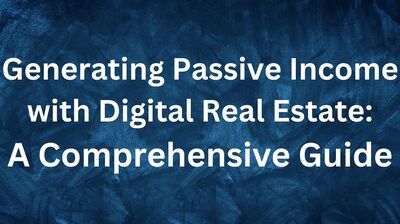- Introduce the concept of digital real estate passive income and its appeal as a lucrative investment strategy.
- Highlight the potential benefits of generating passive income through digital assets, such as websites, domain names, and online businesses.
- Provide an overview of the article’s content, which will offer practical advice and actionable strategies for building passive income streams with digital real estate.

Understanding Passive Income:
- Define passive income and explain its significance as a source of recurring earnings that require minimal ongoing effort.
- Discuss the advantages of passive income, including financial freedom, flexibility, and scalability.
Exploring Digital Real Estate Assets:
- Identify and discuss various types of digital real estate assets that offer passive income potential, such as niche websites, premium domain names, and online businesses.
- Highlight the key characteristics of each asset type and their suitability for generating passive income.
Building Passive Income Streams:
- Provide step-by-step instructions for acquiring, developing, and monetizing digital real estate assets to generate passive income.
- Offer practical tips for selecting profitable niches, creating high-quality content, attracting traffic, and implementing monetization strategies.
Monetization Strategies:
- Explore a range of monetization methods commonly used in digital real estate, including advertising, affiliate marketing, e-commerce, subscription services, and digital products.
- Discuss the pros and cons of each monetization strategy and provide examples of successful implementations.
Leveraging Automation and Outsourcing:
- Discuss the role of automation and outsourcing in streamlining operations and maximizing passive income potential.
- Offer recommendations for automating repetitive tasks, outsourcing content creation, and delegating administrative responsibilities.
Scaling Passive Income Streams:
- Outline strategies for scaling passive income streams by diversifying digital real estate portfolios, expanding into new niches, and optimizing existing assets.
- Discuss the importance of reinvesting profits, tracking performance metrics, and continuously improving asset quality.
Passive Income Tax Considerations:
- Highlight important tax considerations related to generating passive income with digital real estate, including tax implications, deductions, and reporting requirements.
- Recommend consulting with tax professionals to ensure compliance with relevant tax laws and regulations.
Risk Management and Asset Protection:
- Discuss risk management principles for safeguarding passive income streams and protecting digital real estate assets from potential threats, such as cyber attacks, legal disputes, and market volatility.
- Offer recommendations for implementing security measures, obtaining insurance coverage, and diversifying asset portfolios.
Monitoring and Optimization:
- Emphasize the importance of monitoring passive income streams, analysing performance metrics, and optimizing asset performance over time.
- Provide guidance on identifying areas for improvement, implementing A/B testing, and staying informed about industry trends and best practices.
Conclusion:
- Summarize the key takeaways from the guide and highlight the opportunities for generating passive income with digital real estate.
- Encourage readers to take action, start building passive income streams, and leverage the potential of digital real estate to achieve financial independence and long-term wealth.
